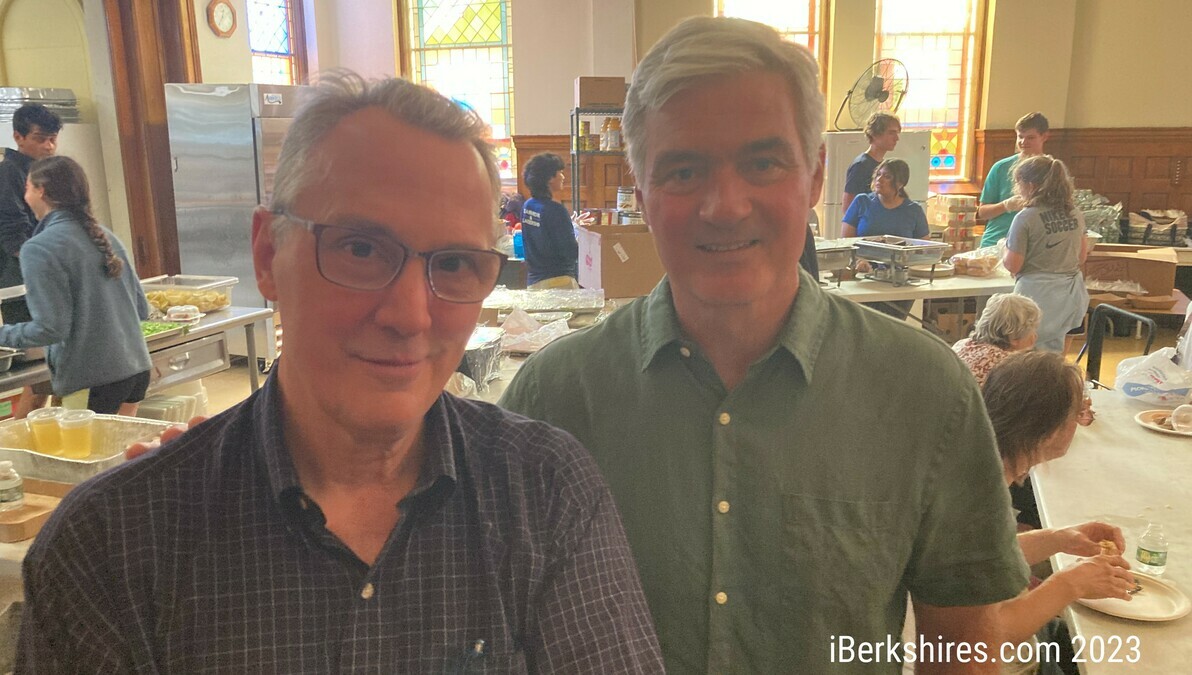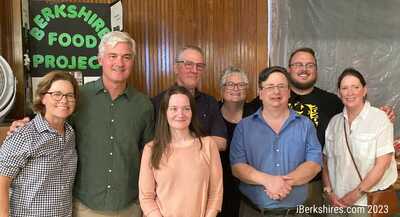Berkshire Food Project Welcomes New Leadership on BoardBy Stephen Dravis, iBerkshires Staff
04:55AM / Friday, July 14, 2023 | |
 James Mahon, the longtime president of the Berkshire Food Project Board of Directors, left, with new President Tim Faselt. James Mahon, the longtime president of the Berkshire Food Project Board of Directors, left, with new President Tim Faselt. |
 | | Berkshire Food Project board members and executive director, from left: Tracy Finnegan, Tim Faselt, Amanda Belanger, James Mahon, Deb Chaulk, Executive Director Mark Rondeau, Christopher Hantman and Lesa Bennett. |
NORTH ADAMS, Mass. — James Mahon has seen the Berkshire Food Project face a number of challenges over 20 years as the president of its board of directors.
One recent hurdle, of course, was unique.
"This is a place that has been meaningful to me, and I do feel like I've got more out of it than I've put in," Mahon said Wednesday as the lunch rush wound down in the project's dining room at First Congregational Church. "Although there have been times when I've been putting in quite a bit.
"During COVID, we lost our executive director, and we were not in the position to hire another one. Nobody was. The labor market was in terrible shape. So the board had to jump in and keep it alive. That's what we did."
And that is the kind of thing Mahon will continue to do for the BFP Board, which he will continue to serve … just not as its president.
This year, the Berkshire Food Project board decided to implement term limits for its presiding officer. On Wednesday, the non-profit celebrated a changing of the guard, recognizing Mahon as he turned over the gavel to Tim Faselt.
"The reason you have term limits is because when you ask someone to join the board, they want to know, 'Is this a life sentence?' " Mahon joked. "You don't want it to be where people decide to leave … and it feels too fraught. It's not that they don't like the agency. It's just that they have, you know, other things to do.
"So having a six-year cycle is useful for that."
The Berkshire Food Project started in 1987, offering, initially, two meals per week. Today, it serves lunch three times per week, though it has offered as many as five healthy, no cost meals per week in the past.
The BFP relies on volunteer labor and donations to make that happen.
Faselt, who steps into the president role after serving as the board's treasurer, is acutely aware how important those donations are.
"We're still very well supported, but the surge [of revenue] that we saw during COVID has come and gone," Faselt said. "So we are now looking for ways to broaden our donor base. I talked to the board about reaching out to friends and family and identifying and writing more grants — all of which was done previously, but it's time to redouble those efforts.
"Because in any given month, we spend more than we take in. Then, during our [autumn] fund-raising campaign, we see a lot of funds come in, but it's very easy. To the extent that this is like running a business, it's a difficult way to run a business. … The volatility can be a little unsettling."
Mahon has been around that volatile "business model" for decades.
"This is an agency that funds itself, but half of its funds come from unsolicited donations," he said. "If you are somebody who is managing an agency like that, that's gonna keep you up at night. If they're unsolicited, you don't know whether they're coming or not.
"Sure, you can have a state grant and things like that. But with unsolicited donations, you just basically have to count on the good will of the community. Sometimes they're up, and sometimes they're down."
With Executive Director Mark Rondeau at the helm, the Berkshire Food Project served nearly 100,000 meals in 2022.
Looking around the room as dozens of diners enjoyed the meals prepared by the project's volunteers, Faselt talked about what drew him to service on the BFP board.
"To be honest, it's something I've wanted to give back to the community after a whole career in banking where I sort of was just focused on my career," he said. "Now that I have more time to give back … many years ago I knew when the time came that this is what I wanted to do.
"For me, the most fundamental thing you need to address is hunger. Everything else works from there — shelter and warmth and community. For me, this was a perfect fit for me to get involved. And when the opportunity came to help even more – like become the treasurer and really dive into the numbers and look at fund-raising … I'm up for it."
| 
